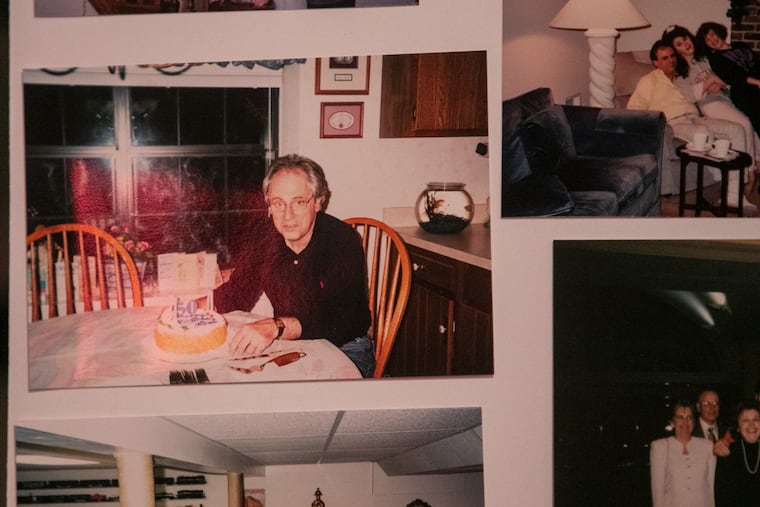A journalist, an Inquirer reader, and a fine man’s life and farewell | Maria Panaritis
Anthony DeVirgiliis may have sent a message from the afterlife. It brought columnist Maria Panaritis to his South Jersey funeral with a reminder that a free press is powerful.

I was in the receiving line at the wake of a virtual stranger. Something had pulled me toward Egizi Funeral Home in Turnersville on Friday. I’d gotten word that an Inquirer reader I had met only once had died. And for some reason, that was reason enough to make the 45-minute trip from Philadelphia into South Jersey.
The pandemic had caused the wake to be delayed by two weeks, so there was no casket. Just flowers and photo galleries of a life I knew close to nothing about: Anthony DeVirgiliis, 72, of Sewell. On a table was a black-and-white picture of him as a baby; another from what looked like his confirmation; in a white tuxedo as a young man; with lifelong love Donata on their wedding day. A faded color shot of him, Donata, and their only child, Michelle Tamburro, on a Jersey Shore beach 40 years ago left a lump in my throat.
The modest line of mourners, all masked, inched past more pictures on an easel until we reached a table with flowers. My eye caught a golden sash on a bouquet of orange roses: “Silly Pop Pop,” it said. Surely, this was from twin granddaughters Mia and Juliette. They’d just honored Pop Pop by doing the Monty Python Silly Walk he’d taught them. It had been his dying wish that they do it at his wake. The retiree who grew up in South Philly and had been ahead of his time in the business of computer software sales had also taught the girls to shoot pool.
Donata, in a wheelchair at the head of the line, had called my newsroom line with a message about Tony’s death from cancer. It had left him skin and bones after an unexpected diagnosis late last year. I had called her back this week.
“Oh, Maria,” Donata told me, “it was just sad.”
I did not know Mr. DeVirgiliis before June 2018. But after I met him, I knew that I wished there were more people like him everywhere. He was no tycoon, doctor, or public servant. He was a kind man who cared about the world around him.
A business card I’d given him when we met two years ago was in a pile of his most essential contacts: mine, a landscaper’s, and a few others in a small batch of cards he kept next to his wallet. As Donata went through the cards after his June 7 death, something weird kept happening. Mine was the only one that would fall out of place, grabbing her attention.
“It was almost like Anthony was tapping me on the shoulder,” Donata said.
Two years ago this month, Mr. DeVirgiliis had left a voicemail message.
He had just read a piece I’d written about forthcoming grand jury findings into Catholic Church abuse that would, upon their explosive release in August 2018, go down in history quite notoriously as The Pennsylvania Report.
“Fantastic,” the voice message began. “Thank you.”
I got the message just a few days after the Capital Gazette newsroom massacre, that murderous act of terror against honorable people, had happened in Annapolis, Md., just two hours south of Philadelphia. My phone blew up with terrifying news alerts while I was interviewing Eagles quarterback Nick Foles, but I pressed forward with the Super Bowl champion as if nothing else was on my mind.
The message from Mr. DeVirgiliis caught me, in other words, at a time of vulnerability.
“Somehow, we gotta keep The Inquirer going for a long, long time,” Mr. DeVirgiliis had said. “We need the printed press. The free press. Thank you for doing this.”
The words brought tears to my eyes.
Thank you for doing this.
I looked him up. Found him across the river in South Jersey and called to introduce myself. Soon, I was in his house, and within days I’d turned this gentle man of firm conviction into a column that he and his granddaughters would read, in his lap, in the very same newspaper he had found so essential to a free world.
“Upright” is how Donata, the bedridden wife to whom he would play love songs every morning, describes her late husband.
He was out of step with his generation in that he felt the acrimony of our current time was born of fear of the unknown. This is what daughter Michelle told me after we met at the wake. He was not afraid. He did not judge.
“Thank you,” she said with a smile, “for the article.”
I remember Mr. DeVirgiliis telling me it was difficult to discuss his views about politics and the president (he was not a Trump fan) even with members of his extended family. Racial animus, he said, seemed to be a factor in too many people’s adoration of the ever-divisive Donald Trump. Mr. DeVirgiliis would make his case unflinchingly.
“He was proud of the fact that he spoke about correct issues in a very upright form,” his wife said.
He lost form once after something he read about former Philadelphia Catholic Archbishop Charles Chaput. Donata chuckled with pride as she recounted that her husband phoned the prelate “and called him a piece of [expletive].”
This one belief remained strong in him even in the final two, disillusioning Trump years: “Speak truth regardless of how family and friends respond. Support reading. And defend the free press,” Donata said.
Mr. DeVirgiliis, it is now my turn to leave you a message. Thank you. (And by the way, that business card business was a nice trick; it worked! May you rest in peace.)